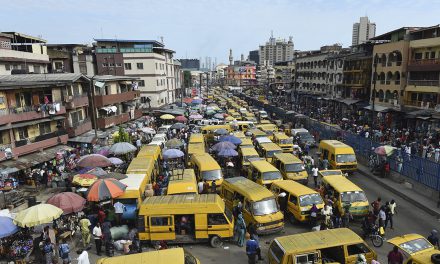“Census Off” shouted a social media post by the state-owned Namibian Broadcasting Corporation on 1 March 2022, in response to a media statement by the Namibia Statistics Agency in which it effectively called off the 2022 population and housing census.

Two young boys at a bus shelter emblazoned with SWAPO election graffiti. Photo: Trevor Samson/AFP
The Namibia Statistics Agency (NSA) reportedly called off the national census, supposed to take place in August this year, because no money had been allocated in the country’s national budget for the 2022/23 financial year. Finance Minister Iipumbi Shiimi tabled the budget in the Namibian National Assembly on 24 February 2022.
Two days before the budget was tabled, head of the NSA, Statistician-General Alex Shimuafeni, in correspondence with Africa in Fact, hinted that the census might not happen when he stated that “censuses and surveys are costly, and the current low-growth economic environment causes major challenges for the funding of the NSA from the government to carry out the surveys and census as frequently as possible”.
The national census, initially meant to take place in August 2021, was postponed due to Covid-19. The pandemic has depressed a national economy already in a state of protracted deterioration since 2016, with increasingly constrained state revenue collection and considerably tightened state spending. This was once again reflected in the 2022/23 budget.
The fact that Namibia will not be conducting a census in 2022 – which would have collected data on more than 80 indicators for everything from population size, location and migration, to housing, health and education demographics – exacerbates perennial concerns about the usefulness and credibility of official data.
Over the years, foreign diplomats and investors, as well as journalists and researchers, have complained that Namibia does not produce and publish enough data, on enough issues and sectors, at regular intervals and timeously, to get a clear and accurate picture of the evolving state of the country’s society and economy.
This despite Namibia’s ambition to become knowledge- and data-driven by 2030, as articulated in the Namibian government’s Vision 2030. This ambition was “highly unrealistic” to social researcher Dietrich Remmert, a research associate at the Windhoek-based Institute for Public Policy Research (IPPR). “I think there are enough statistics and anecdotal evidence to be very sceptical about this Vision 2030 goal,” Remmert stated in correspondence with Africa in Fact.
In the same vein as Vision 2030, the second iteration of Namibian President Hage Geingob’s signature development blueprint, the Harambee Prosperity Plan II 2021-2025 (HPP2), calls for the formulation and implementation of “a coherent development and modernisation plan” that is broadly supposed to emerge from improved state sector data reporting.
The plan speaks of stimulating sectors with the potential for labour-intensive activities, but no-one knows what the true state of employment and jobs is, especially in the wake of two years of largely anecdotal employment devastation wrought by the Covid-19 pandemic. The last National Labour Force Survey (NLFS) was published in 2018 by the NSA and is considered out-of-date.
“The key issue of labour force statistics has been neglected. The last one [NLFS] was in 2018, despite the NSA saying it wanted to produce them annually,” said UK-based freelance economist Robin Sherbourne, who for a long time resided and worked in Namibia, in an online interview with Africa in Fact.
In a pointed critique of the HPP2 ambition of formulating and implementing “a coherent development and modernisation plan” in the absence of such critical inputs as credible labour data, Sherbourne, author of the seminal Guide to the Namibian Economy, said: “It is not possible to successfully run a modern economy without good data. But, again, I see little evidence of data being used to put together effective policies, so the lack of data does not prevent policymakers from going ahead. Namibia’s poor economic performance reflects this lack of interest in getting policy right.”
The NSA’s Shimuafeni did acknowledge to Africa in Fact that the absence of current employment data was problematic, stating obliquely: “The next labour force [survey] date is not yet decided as it depends on the funding thereof. NSA is also busy re-engineering its processes to improve the area of labour administrative statistics. Currently, a labour market information system is being developed to collect all labour administrative data from various stakeholders. This system will enable NSA to produce monthly, quarterly or even annual employment/unemployment statistics.”
However, besides out-of-date labour data, Namibia’s economic picture is also befuddled by other long-standing data paucities, according to economic researchers and observers like Sherbourne.
“Some sectors such as fishing seem to have disappeared almost entirely, Sherbourne said. “Thus, the Ministry of Fisheries and Marine Resources no longer publishes statistics like it used to. Fishing and fish processing are not separately identified in the national accounts or labour force surveys.
“There is no proper enterprise survey, so we know very little about corporate growth and change. We have nothing on which to base black economic empowerment (BEE) policies, which get advanced on the basis of no data and no research.
“We have no data on house prices, which play a major role in the economy and macroeconomy. We have little data on consumption expenditure. Namibia’s diamond industry is virtually a black hole, and the public is left to guess what is really happening. The Ministry of Finance does not publish useful tax data to any significant extent. The budget documents no longer contain information about public sector employment.”
And he added: “I could go on and on. From the outside it seems that statistics are at best suffering from benign neglect, at worst politicians don’t want the true state of the economy to be revealed.”
While acknowledging these criticisms, Shimuafeni was adamant that state authorities appreciated the significance of accurate and current data in development planning, service delivery and good governance within the state sector.
“Accurate and up-to-date statistics contribute to better and well-informed policies and programme formulations. They also contribute to evidence-based planning and decision making,” he said. “Good governance means efficient and effective, fair/equitable and sustainable decision-making that could only be possible if accurate and timely data is being used in the process.”
However, others are unconvinced that Namibian politicians and bureaucrats care to be well informed or data-guided, and thus do not value or do not recognise the significance of deploying big and complex datasets to inform their decision making.
“I do not believe Namibian ministers are often confronted with their own government’s statistics. No one seems terribly interested,” said Sherbourne. “One can produce the best statistics in the world, but if there is no real demand to use them, they will be of little use. Likewise, the government does not really commission research before making decisions, and when it does it often gets a donor to pay for it, demonstrating that it is not really serious about research and evidence-based policy.”
This sentiment was shared by the IPPR’s Remmert, who said: “I often get the impression that many policymakers and leaders in the public sphere steadfastly ignore pertinent data and studies on many socio-economic aspects.”
With the Namibian census called off recently, and the Namibian government continuing to navigate disrupted and disturbed socioeconomic and political waters in a state of near data blindness, impressions such as these are probably set to harden as many policy interventions arguably continue to be a case of hit-and-hope.
(Disclaimer: Frederico Links is also a research associate at the Institute for Public Policy Research (IPPR), where he is involved in several projects. Similarly, Robin Sherbourne has done contract work for the IPPR.)










